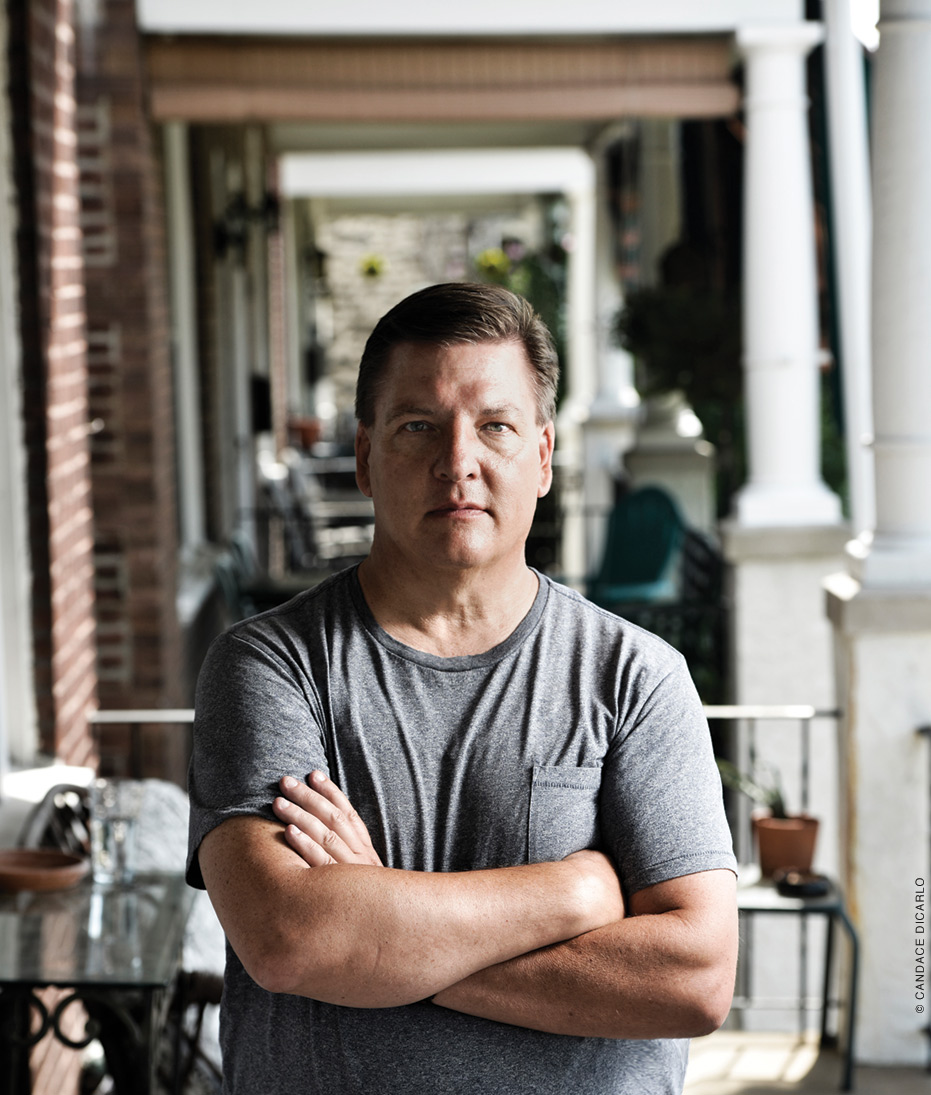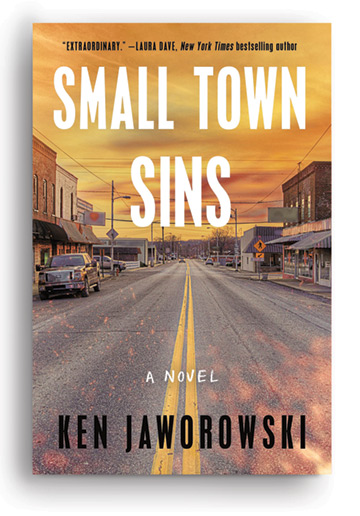
Inspired by Penn’s MLA program and the allure of rural Pennsylvania as a setting for a mystery, a debut novelist is born at 55.
From his home in the Roxborough section of Philadelphia, Ken Jaworowski GGS’00 only had to drive about two hours west to get to Shippensburg University of Pennsylvania.
But it may as well have been a world away.
On his first morning of college in the late 1980s, he was awoken with a start by a sound he didn’t recognize. “I’m like, What the hell is that?” Jaworowski recalls. “You know what it was? The Amish riding by with their clip-clop. It blew me away.”
Though charmed by the horse and buggy and other quaint aspects of rural Pennsylvania life, Jaworowski soon returned to cities—Philadelphia, where he began a career in journalism and took night classes at Penn, and later Manhattan, where he worked for the New York Times and wrote plays.
But about three years ago his small-town memories came flooding back when he took his daughter across Pennsylvania to visit colleges. And he thought: “Man, this would be such a great place to set a novel.”
Seven months later, Jaworowski completed Small Town Sins (Henry Holt), a page-turning thriller that follows three down-on-their-luck characters through arcs of tragedy, mystery, and redemption in the fictional town of Locksburg, Pennsylvania. The first novel that Jaworowski sold to a publishing company after decades of trying, Small Town Sins was released on August 1 and garnered early positive reviews—a pinch-yourself moment for Jaworowski, who at 55 had been just about ready to give up on his dreams of being a novelist.
“I was like, This is the last one. If I don’t publish this, I’m not going to waste my time anymore,” he says. “It just eats up so much time and I worry about it. But son of a gun, I finish it. And then three weeks later, my agent sells it to Henry Holt. I’m jumping out of my skin.”
Sporting the “worst Philadelphia accent,” Jaworowski is a fast talker with an infectiously positive spirit. He often deploys the word awesome—whether he’s talking about getting fan mail from a reader, hearing back from authors he blindly emailed to blurb his book, or especially the opportunities that stemmed from his nontraditional journey through Penn.
When he was at Shippensburg, from which he graduated in 1991, Jaworowski “was a completely horrible student who barely got out with his undergrad degree.” Partying a bit too hard might have been one reason. Another, he reckons, was his decision to study finance. “I didn’t even like that, but I figured that’s the way you make money,” he says. “I love books, I love writing, I love reporting, I love journalism. Why did I get a finance degree?”
It worked out for him insofar as he started covering business as a reporter for Bloomberg News after college. But there was still an itch he needed to scratch. So on top of daily commutes from Philly to Skillman, New Jersey, for his Bloomberg job, he enrolled in Penn’s Master of Liberal Arts (MLA) program in what was then the College of General Studies (now the College of Liberal and Professional Studies). That’s when, he says, “everything opened up.”
From the fall of 1998 to the spring of 2000, Jaworowski embraced classes in a way he never had at Shippensburg, even though he usually took them after a full day of work. He soaked in lessons on literature and theater, “picked up the energy” of students a decade or so younger, and felt inspired by his professors—particularly Ralph Rosen, the Vartan Gregorian Professor of the Humanities and a professor of classical studies, and Deb Burnham G’76 Gr’89, who taught courses in American and British fiction. “They were the two best professors I’ve ever had in my life,” says Jaworowski, who wrote a play for his thesis and loved hearing remarks from Nobel Prize–winning poet Seamus Heaney Hon’00 at his Commencement.
Jaworowski also started a newsletter to try to connect “a loose group” of MLA students (who have access to classes and departments across the University and can customize their coursework). And he studied abroad at the University of Oxford through an exchange program—“which was awesome,” he says, “a highlight of my life.”
“I’m getting woken up by Amish people in a state school in one place, and a couple of years later, I’m at Oxford—Oxford!—studying Shakespeare,” laughs Jaworowski.
His time at Penn, he says today, changed the direction of his life.
A few years later, after having moved to New York following his Penn graduation, he left Bloomberg—“How many great stories can you write about banking?”—to become a culture editor and critic at the New York Times. And on top of reviewing theater, he wrote some of his own—“smaller stuff, mostly nonprofit theater” produced off Broadway and in Europe, he says. One of his six full-length plays, Interchange, enjoyed a sold-out run at New York’s WorkShop Theater and was optioned for movie development (though the film hasn’t been made).
Yet publishing a novel remained a tantalizing dream. Thinking about the way he grew up in Roxborough, Jaworowski “always wanted to write the next The Outsiders,” he says of S. E. Hinton’s famed 1967 coming-of-age novel. “I didn’t grow up in a gang or anything, but it was a little bit on the rough side.” His first couple of attempts fell through. Then he “tried to write a semi-mystery,” but “that didn’t seem to work” either.
When he started writing Small Town Sins, he didn’t tell his wife or anyone else, bracing for another letdown. He isn’t sure why this one clicked in a way that earlier ones did not. Perhaps one reason was his richly nostalgic sentiments toward Rust-Belt American towns, which the novel describes as “the kind of place that generous people would call quaint, dismissive ones would call the boondocks, and smart-ass ones would call Pennsyltucky.”
Leading up to the novel’s release date, Jaworowski sent the book to some of his favorite authors and was pleasantly surprised to get about 10 blurbs in return, including one from Laura Dave C’98, who wrote the bestseller The Last Thing He Told Me (recently adapted into an Apple TV+ series starring Jennifer Garner).
Another author, Emma Donoghue, replied to Jaworowski that she didn’t have time to read the novel but told him something even more memorable. “I said, ‘Look, I’m 55 and this is my first novel,’” Jaworowski recalls. “And she said to me, ‘Hey, it’s not gymnastics—you can start at any time.’”
He plans on paying that advice forward to other aspiring novelists and people like him who might be “pissed” they didn’t get something published. “It’s never too late,” says Jaworowski, who’s already completed another novel that he hopes will soon be released. “You’re never too old. You can always start. It’s not gymnastics.” —DZ
EXCERPT
Failure to Flee
“Had I walked out that door then, how many lives would have been different?”
I can trace so much of my life back to a summer night when I was seventeen. Everything starts from then and links the years that follow, like one of those connect-the-dots pages you played with as a kid: Begin right here, draw a line to there, then another, then again. Sooner or later, an image emerges.
I’d recently finished my junior year of high school and was kicking around a few ideas on how to get out of Locksburg, a Central Pennsylvania backwater I’d wanted to flee ever since I was old enough to misspell its name. College was a possibility. The marines, a cheaper one. Either would work, as long as it got me away.
I had a nodding acquaintance with my classmates but no real friends among them. That’s not because of bad behavior on my part. The opposite was true: I was the only child of a sweet-spoken, disabled mother and a deacon father who together looked after a struggling church that was too poor to support a full-time priest. When I wasn’t doing schoolwork or house chores, I was at Saint Stanislaus, chipping melted wax from the candleholders or cementing the cracks that the bitter winters brought to the stone walls outside.
One Saturday night I was walking home from the church, head down, hands in pockets, when I turned a corner. LeeLee Roland was bounding down the steps of her house, ten yards away. She was a soon-to-be sophomore who stood out from the other girls at school. Even at fifteen, she was brazenly flirty to most every guy but me. I’d watch her with a side-eye, fascinated but wary, as she bounced along the high school halls.
“Hey, Nate!” she called, employing a nickname I didn’t use. I raised my chin and hid my surprise. We’d never spoken before, and I was a little amazed that she knew who I was.
“You going to the party too?” she asked.
“Nah,” I said, as if I knew which party that was.
“Yes, you are. I’m kidnapping you.”
She hooked a hand around my arm, and the breath left my lungs. To feel a girl touch me, even with just a friendly move, nearly froze me. That touch, combined with the warm June breeze, was instantly intoxicating, as if I’d swallowed an entire bottle of altar wine.
“Where is it?” I said, tamping down my voice in the hope of sounding somewhat cool.
“Tracy’s house,” LeeLee said. “Willow Street.”
I nodded a few times too many while piecing it together: Tracy Carson lived there, another girl I’d never spoken to. LeeLee and I walked two blocks then turned onto Willow.
“I’m . . . I’m not really sure I’m invited,” I said, entirely sure I wasn’t.
“She don’t care. Anyway, too late,” LeeLee said, and turned to walk up the steps of a house. She let go of my arm. I felt both real relief and deep disappointment.
LeeLee courtesy-knocked then pushed the door open. Inside, about fifteen people were circled around the dining room table, playing some kind of drinking game. All were familiar faces. In a town of about five thousand, you saw everyone at one time or another.
“Look who I found,” LeeLee told the group. They seemed indifferent. For that, I was grateful. Anything short of disdain was enough to make me half happy. Like any seventeen-year-old, I was perpetually confused and occasionally anxious, all while acting as confident as I could.
Forty-five minutes later, the number of people had nearly tripled, and the radio, blaring classic rock, had gotten turned up twice as loud. I’d taken a place against a wall, nursing a can of lukewarm Keystone Light and watching the games that no one asked me to join. After finishing my beer, I acted as if the can were full, bringing it to my lips time and again. LeeLee had gone to the kitchen and brought me the beer when we’d arrived. She’d since disappeared upstairs with a pack of other girls.
I debated leaving. No one would notice.
I eyed the door.
Any time up until then had been pivotal, of course. What if I had stayed at church a few extra minutes and never saw LeeLee? Or what if I had taken another route home? But when I look back, that moment seems the most decisive, the last real instant when something could have changed. Had I walked out that door then, how many lives would have been different?
Excerpted from SMALL TOWN SINS by Ken Jaworowski. Copyright © 2023, Henry Holt & Co. Reprinted with the author’s permission.





